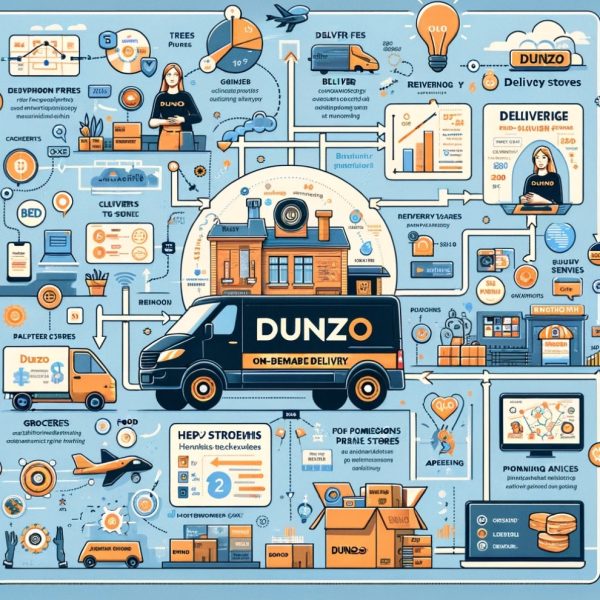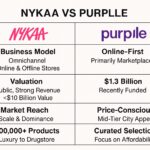Dunzo: Pioneering Quick Commerce with Innovative Urban Solutions
February 24, 2024
Subject: Startups

Dunzo stands out in the hyperlocal delivery market through its commitment to speed, convenience, and technology-driven solutions. Its strategic partnerships, recent expansions, and continuous product enhancements highlight its proactive approach to meeting consumer demands. The backing by major investors like Google underscores confidence in its business model and growth potential.
Despite the competitive landscape, Dunzo’s focused strategy, especially in metro cities, positions it well for future growth. However, diversifying its service offerings and expanding geographically are critical for its sustained success. With a keen eye on leveraging technology and data, Dunzo is poised to adapt and thrive in the dynamic e-commerce sector.
Introduction
Dunzo is an Indian company that operates an on-demand delivery service. The startup, based in Bengaluru, offers a platform that allows users to pick up and deliver packages, buy essentials, order groceries, and get food from nearby restaurants. The concept of Dunzo revolves around the idea of saving time and adding convenience to its users’ daily lives, making it an integral part of urban living.
Business Model
Dunzo operates on a hyperlocal logistics model where it connects customers with the nearest available delivery partner to ensure quick and efficient service. The company earns revenue through delivery fees charged to customers, commissions from partner stores, and advertising revenues from various brands that wish to promote their products on the platform.
Valuation and Funding
As of February 24, 2024, Dunzo’s valuation has significantly reduced, standing at about $200 million. This marked decrease is part of a broader context where Dunzo is seeking to raise $35 million through a rights issue at this reduced valuation, down from its peak value of $800 million. The valuation adjustment comes in the backdrop of operational and financial restructuring within the company, including leadership changes and a focus shift towards B2B services, indicating a strategic pivot in its business model amidst a challenging market environment.
Competitors
Dunzo faces competition from a range of players in the hyperlocal delivery market, including Swiggy’s Genie service, Zomato, and Amazon. Each of these competitors has its own strengths, such as a larger user base, broader geographic coverage, or additional services. However, Dunzo differentiates itself through its focus on quick, intra-city deliveries and a user-friendly platform.
Investors and Founders
Dunzo’s notable investors include Google, Lightbox, Blume Ventures, and Aspada. The company’s founders, Kabeer Biswas, Ankur Aggarwal, Dalvir Suri, and Mukund Jha, have diverse backgrounds in technology and entrepreneurship, which have contributed to Dunzo’s innovative approach and strategic direction.
SWOT Analysis
- Strengths: Quick turnaround time, strong brand recognition, and a robust technology platform.
- Weaknesses: High operational costs and dependency on urban markets.
- Opportunities: Expansion into tier 2 and tier 3 cities, diversification of services, and leveraging AI for operational efficiency.
- Threats: Intense competition, regulatory challenges, and changing consumer preferences.
Recent Developments
Recent developments for Dunzo in February 2024 highlight several critical challenges and strategic considerations for the company. Dunzo has been experiencing significant financial strain, evident in its need to defer salary payments to its employees and execute layoffs to manage its cash flow effectively. Former employees were informed about pending salary payments for June and July, with final settlements to be completed by February 2024, reflecting the company’s cash-strapped situation. Additionally, there were reports about Dunzo’s co-founder Dalvir Suri stepping down from his role, which marks a significant change in the company’s leadership structure.
Financially, Dunzo reported substantial losses for FY23, with operational costs far outstripping its revenue, raising concerns about the company’s long-term viability. The company’s reliance on external funding was underscored by its significant operational expenses and the need to streamline its business model, particularly by scaling down its quick commerce operations and closing its dark stores. Despite these challenges, Dunzo continued to seek additional funding to stabilize its operations and facilitate future growth.
Strategically, Dunzo has been looking to adapt by partnering with third-party stores after shutting down its dark store operations. This shift aims to reduce operational costs and leverage existing retail infrastructures to maintain its service offerings. The company’s efforts to secure new funding and potentially restructure its business model are crucial for its sustainability and growth in the competitive quick commerce and hyperlocal delivery market.
Moreover, there were reports about Flipkart, a major Indian e-commerce player backed by Walmart, engaging in discussions to potentially acquire Dunzo. However, complexities regarding Dunzo’s ownership structure, particularly the significant stake held by Reliance Industries, have posed challenges to any acquisition deal. This development indicates the interest in Dunzo’s market potential despite its current financial difficulties and underscores the dynamic nature of India’s tech and startup ecosystem.
These developments reflect the broader challenges within the quick commerce sector in India, where competition is intense, and profitability remains a key concern. Dunzo’s journey through these challenges will be crucial to watch for stakeholders and market observers alike, offering insights into the resilience and adaptability of startups in this space.








